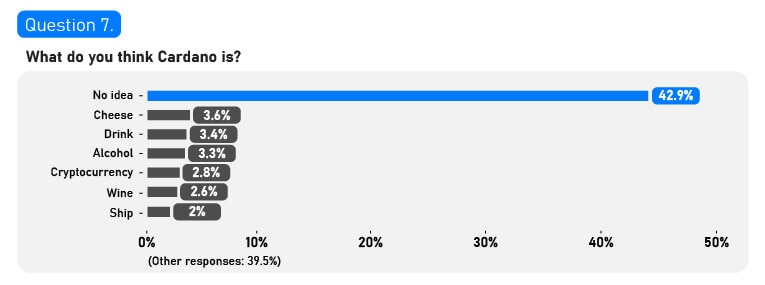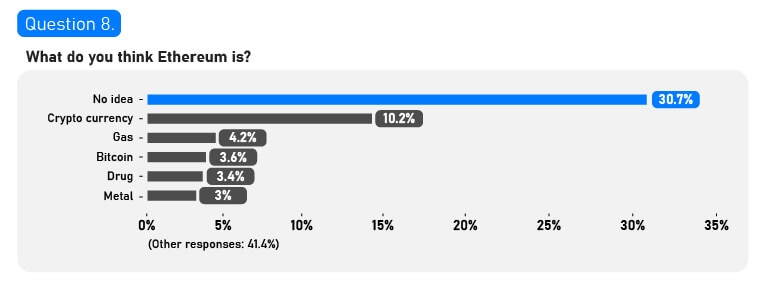Is Ethereum a drug, and Cardano some kind of fancy Italian hard cheese?

A new study has highlighted the lack of mainstream knowledge of cryptocurrency, with members of the public believing Ethereum is some kind of illicit drug, and Cardano is a cheese.
The survey, conducted by Traders of Crypto reveals just how much the general public knows about cryptocurrency and their thoughts on its future.
Despite all the noise surrounding cryptocurrencies, surprisingly just under a quarter of people have “no idea” what crypto is (22 per cent). Three-quarters of respondents said they don’t believe crypto will ever be legal tender (75 per cent).
A quarter of people (25 per cent) still have no idea what Dogecoin is, despite Elon Musk’s persistent and shameless plugging of the meme coin.
When asked whether they believed that cryptocurrency would become legal tender, the vast majority of the British public were unconvinced, with 75.7 per cent responding “no”.
Of those who believed that it would become legal tender, most assumed that this would happen within the next ten years, while the largest portion of “yes” responders (9.8 per cent) believed that this would happen in as little as five years’ time.

Despite the huge gains that many cryptocurrencies have experienced in the last 12 months, only 5.6 per cent of those surveyed believed that crypto was a safe investment, compared to the 64.6 per cent who thought otherwise.
The largest group of respondents were people who don’t know what crypto is, with 22.4 per cent responding “no idea”. This shows that before they can consider crypto as a viable investment opportunity, many people still possess little or no knowledge of the space.
That said, 21 per cent of respondents replied with either “digital currency”, “online money”, or “virtual money”, which while perhaps being simplified explanations of what cryptocurrencies are, does show that a large section of the public is at least aware of crypto.
Bitcoin’s indisputable brand recognition
Bitcoin is the archetypal cryptocurrency. It was the original digital coin that sparked the crypto revolution and should, therefore, have the largest level of public awareness. And yet, only 13.3 per cent of respondents claimed not to know what Bitcoin was, which is substantially low considering that almost a quarter of those surveyed also didn’t know what cryptocurrency was. This, perhaps, exemplifies Bitcoin’s indisputable brand recognition and, for some, its association with the crypto market as a whole.
While 20.7 per cent identified Bitcoin as a cryptocurrency, 22.7 per cent of respondents replied that it was either “currency”, “digital currency”, or “online currency”. This suggests that many more people have a general idea of what Bitcoin is.
It’s also interesting to note that the next highest answer was “rubbish”, which was chosen by 3.9 per cent of those surveyed. This shows that while awareness of Bitcoin and cryptocurrency is becoming more widespread, there is a traditionally-minded element that, even if they understand what crypto is, are not convinced by either its value or legitimacy.

Cardano is the world’s third most popular cryptocurrency, but how well is it known to the average person in the street? A sizeable 42.9 per cent of those surveyed admitted to not knowing what Cardano is, but judging by some of the other most popular answers that figure is considerably higher. This is further exemplified by only 2.8 per cent of people correctly responding that Cardano was a cryptocurrency, so what did the rest think it was?
The most popular response after “no idea” is that Cardano is a type of cheese, an opinion shared by 3.6 per cent of respondents.
The next most common response was that Cardano was a drink. However, if you combine this with those who responded with “alcohol” or “wine”, you reach a total of 9.2 per cent, which outstrips the “cheese” answer and is more than triple those who knew it to be a cryptocurrency.
Ethereum is the second largest cryptocurrency in the world, yet only 13.8 per cent of people correctly identified Ethereum as a cryptocurrency, with 30.7 per cent claiming to have no idea what it is.
Again a small but notable number of respondents incorrectly assumed Ethereum to be the same as Bitcoin, showing that the two terms’ meanings are often conflated by the public. However, possibly due to the more scientific-sounding name of Ethereum and the lack of the term “coin” in its moniker, people seem to confuse it with a much wider range of things.
This is evidenced by the third most common response being that Ethereum was a gas, which accounted for 4.2 per cent of respondents. Other misconceptions about the nature of Ethereum are that it is a drug (2.4 per cent) or that it was a metal (3 per cent).